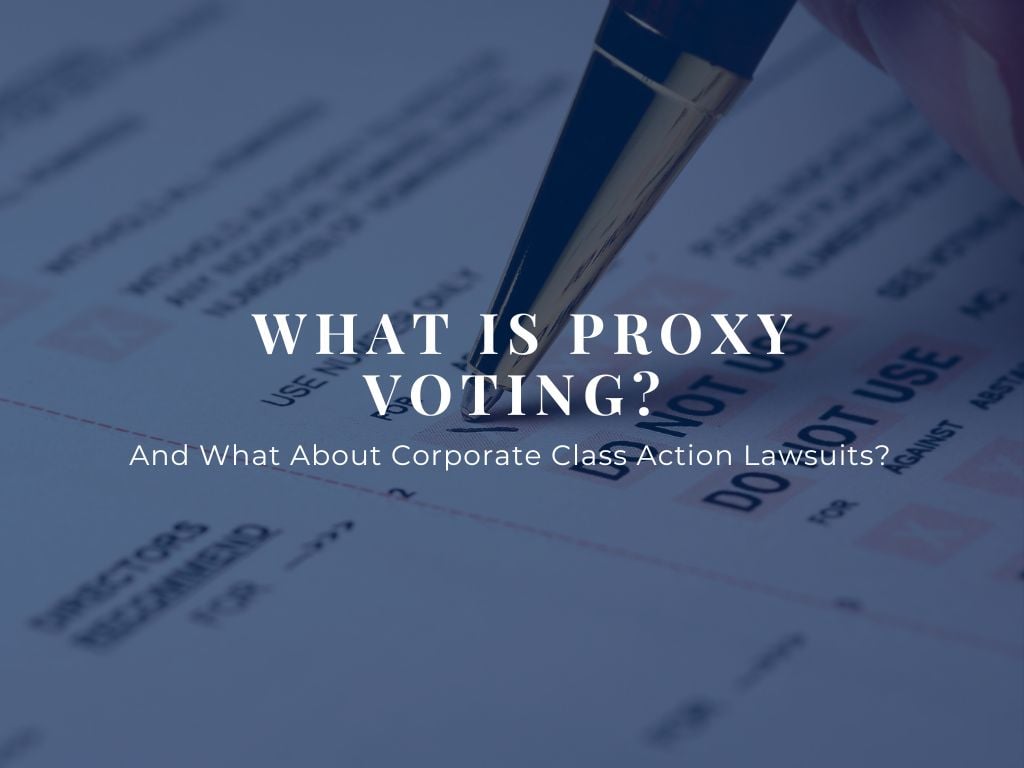
When you own shares of a company, whether it’s a single share or thousands of shares, two things you must deal with are proxy voting and corporate class action lawsuits. Both are often quite tedious, but the good news is that when you work with a Carnegie advisor, we can handle them for you. Here’s everything you need to know about proxy voting, corporate class action lawsuits and how Carnegie handles them.
What Is Proxy Voting?
Certain company decisions must be put to a shareholder vote. All shareholders who do not attend the shareholder meeting have the ability to vote via a proxy vote. Proxy voting usually occurs annually and includes voting on the board of directors and various proposals, such as executive compensation or mergers. Some issues are fairly straightforward while others are more contentious.
Handling Proxy Voting
Those who work with an advisor may choose to either vote the proxies themselves or have the advisor handle the proxy voting for them. Due to the complexities involved in proxy voting, the vast majority of the time clients choose to have the advisor handle the proxy voting.
If you choose to vote your own proxies, you can either get a paper ballot, which you’ll receive in the mail, or you can go paperless and receive an email with a link to vote online. Either way, you’ll have a ballot that typically has between five and 20 items to vote on. You make your selections and cast your vote.
When Carnegie handles the proxy voting, instead of voting each proxy individually, we use a third-party service provider to streamline the process. The account information is fed through the provider’s system, which accumulates accounts from all custodians and aggregates them into one sum. Carnegie then votes based on a voting preference list, which compiles a list of how the 30 largest money managers vote. Since these money managers have entire departments devoted to proxy voting, we tend to follow their lead, though we always have the flexibility to vote how we want. We may break from the pack in certain instances, such as for what we consider to be excessively large executive compensation packages.
The Takeaway on Proxy Voting
The vast majority of people who work with Carnegie choose to have us manage the proxy voting for them. This saves our clients time, limits paper waste and allows for more informed voting. And of course, if a client normally prefers to have us manage their proxy voting but wishes to vote a certain way on a specific issue they can always call, and we’ll vote accordingly.
What Is a Corporate Class Action Lawsuit?
A class action lawsuit is a legal proceeding in which a plaintiff (or plaintiffs) brings a lawsuit on behalf of a class (a larger group) of individuals. Two recent examples of class action lawsuits include the 3M earplug lawsuit, in which thousands of veterans were entitled to financial compensation due to faulty earplugs that caused hearing loss and tinnitus, and the Camp Lejeune drinking water lawsuit, in which veterans were exposed to contaminated drinking water.
Corporate class action lawsuits are legal proceedings on behalf of shareholders. In a corporate class action lawsuit, shareholders may be entitled to financial compensation. This can happen when there is a merger, and the lawsuit alleges the company did not sell at a high enough price.
How Carnegie Handles Corporate Class Action Lawsuits
Carnegie uses the same third-party service provider we use for proxy voting to handle corporate class action lawsuits. The system accumulates all lawsuits and figures out if the client owned shares during the relevant time period and how many shares they owned. The service provider then sends the necessary paperwork to the claims administrator. At the end of the quarter, the provider then sends any money directly to clients.
Shareholders who must handle this themselves must deal with a lot of hassle for what is often very small payouts; often only a few dollars. Automating the process allows the client to get their money without requiring them to waste their valuable time.
The Takeaway
Whether it's proxy voting or corporate class action lawsuits, we take on the hassle of tedious financial tasks, so you don’t have to. If you have questions on either of these topics, feel free to reach out to a Carnegie advisor. We would be happy to discuss your options.
Need an Investment Advisor?
If you are currently looking for help with investment management, contact us. We are happy to schedule an introductory meeting at your convenience.



